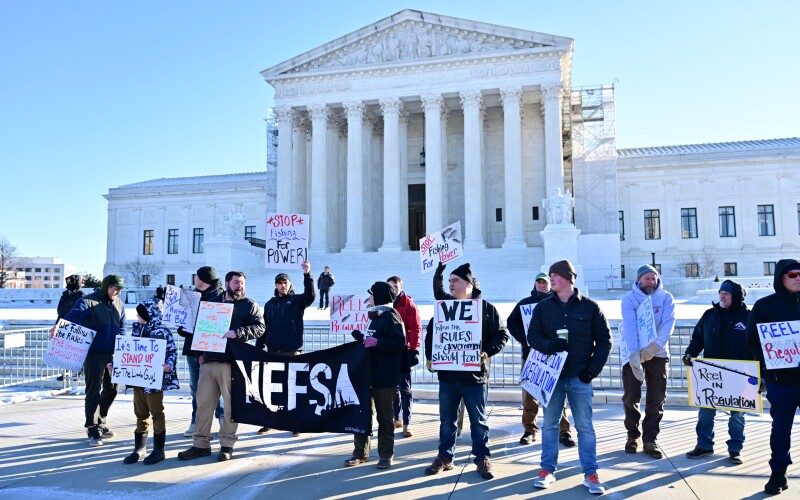Herring fishermen in New Jersey and Rhode Island who objected to paying fees for fishery observers scored a victory in the U.S Supreme Court Friday that could upend 40 years of federal rulemaking.
The court’s 6-3 decision in the twin cases will have profound effects across U.S. government and industry, setting new limits on how executive branch agencies regulate energy, transportation, food and drugs and other health, safety and environmental rules.
Lawyers with conservative legal activist groups brought the cases, Loper Bright v. Department of Commerce and Relentless v. Department of Commerce, on behalf of fishermen who challenged a National Marine Fisheries Service rule that required them to carry onboard observers to monitor fishing, and pay costs for the observers contracted by NMFS, at up to $700 a day.
The cases hinged on the so-called "Chevron deference," a landmark ruling in federal administrative law dating back to a 1984 dispute between the oil giant and environmental activists of the Natural Resources Defense Council. In that earlier Supreme Court decision, justices ruled that the courts should “defer” to executive agencies’ reasonable interpretations of federal statutes.
As part of managing the Atlantic herring fishery, NMFS told fishermen they had to pay observer costs. Fishermen protested the agency was appointing itself power without Congressional authority to impose a new fee.
NMFS waived the rule in early 2023 as the agency ran short of money to administer the program. But fishermen wanted to make sure the observer requirement is not renewed – and their conservative legal allies were eager to see a conservative-dominated Supreme Court revisit the Chevron doctrine.
In his opinion for the conservative majority, Chief Justice John G. Roberts Jr. declared the Chevron doctrine “fundamentally misguided,” and wrote that “courts must exercise their independent judgment in deciding whether an agency has acted within its statutory authority.”
“Chevron’s presumption is misguided because agencies have no special competence in resolving statutory ambiguities,” said Roberts. “Courts do.”
“Today’s restoration of the separation of powers is a victory for small, family-run businesses like ours, whether they’re involved in fishing, farming, or retail,” said Bill Bright, a Cape May, N.J. fisherman and plaintiff, in a joint statement with lawyers from the Cause for Action Institute. “Congress never authorized industry-funded monitoring in the herring fishery. And agency efforts to impose such funding hurts our ability to make an honest living.”
“From now on, NOAA and other federal agencies will have to think about the consequences of their actions without the benefit of Chevron,” said Meghan Lapp, fisheries liaison and general manager at Seafreeze, Ltd. In Rhode Island, a plaintiff in the Relentless case.
“We finally have an even playing field in the courts, and the government will have to pay its own regulators’ salaries without forcing that cost directly on hard-working fishermen. I’m so grateful.”
While legal activists argued Congress never authorized that power to NMFS, supporters of the Chevron doctrine contend the high court’s decision actually will concentrate more power in the judicial branch, without the regulatory expertise of agencies.
In a dissent from the bench, Justice Elena Kagan warned that “courts, in particular this court, will now play a commanding role” in regulatory decision making.
Environmental groups have been dreading the Supreme Court showdown on Chevron.
“Our justice system at the highest level failed our oceans and the American people today,” said Beth Lowell, a vice president with the group Oceana. “This decision shows that politically appointed judges could be making the final call instead of experts in government agencies. This puts at risk government decisions not just on fisheries, but also on clean water, clean air, public health, food safety, and protecting wildlife.”







